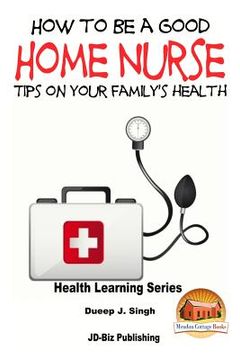Reseña del libro "How to Be a Good Home Nurse Tips on your family's health (en Inglés)"
How to Be a Good Home Nurse Tips on your family's health Table of Contents Introduction Failure to Follow a Doctor's Instructions Rest and Quiet for Your Patient Take Your Prescribed Medicine Regularly Seeking Medical Help Too Late When to See a Doctor Overuse or misuse Of Medications Laxatives Natural Vitamins and Chemical Supplements Medical Records Accidents Just Waiting to Happen Taking Medical Health Training Attention to the Family's Diet Cannot Do without Junk Food? Potato Chips at Home Spicy Salt Healthy Mix - to Sprinkle on Salads Onion Flakes Taking Care of Your Patient at Home Medications Making a Natural VapoRub The Patients' Diet Food for the Sick Recipe for Invalid Chicken Broth Basic Egg omelets French omelets Spanish omelet Traditional Lemon Squash (Nimbu pani- lit- lemon water) Tapioca Pudding Onion Soup Traditional Tomato Cheese Rarebit How to Become A Home Health Aide State Requirements for Home Health Aides Conclusion Author Bio Introduction Each of us is growing older with every passing moment, and most of us subconsciously have a nagging worry about who is going to take care of us, when we get old or when we are sick. Women, far more than men dread the idea of growing old. That is because they subconsciously have the fear that there will be nobody to take care of them, then they grow comparatively old and helpless. The first adjustment to this idea comes in middle age, with its foreshadowing of old age. This is when middle-aged people begin to think about the next stage of life. If a woman has devoted her life to being the center of her family, she may look ahead fearfully to the days to come, when her children will be adults and will have flown the nest. If she has a happy married life, she knows that she has her partner, who is going to grow old with her. But unfortunately sometimes it just happens that homes break up and many people find themselves approaching middle age, and future old age, in loneliness. That is when they begin to take good care of their finances so that they have enough of money, which they can utilize when they are old. Among all the impermanent and threatening shadows of the days to come, a woman may have before her the example of some cantankerous old lady who has become an unloved, and unwelcome burden to her children demanding and less attention from some already hard-pressed daughter-in-law or daughter. And this condition worsens, if that person is ill. In the East, where the idea of sending parents to an old-age home, is still something of which one thinks of with loathing and abhorrence, nursing of the eldest generation is done at home. Affluent families keep home nurses who are professional. Other not so affluent families take care of the elders, not because it is their duty, but because it is part of the Eastern and Oriental social fabric, coming down the ages. However, this idea is slowly being eroded in many cities, because the children are more bothered about making money, instead of giving proper care to their elders. The elders also try their best to keep away from under the children's feet and make sure that they are financially secure. The day of the joint family is slowly and steadily disappearing, when the younger generations used to take care of the older generations. It is often said by Easterners, that in many countries in the West, they have lost the sense of filial duty, which still exists in so many Latin and Eastern countries. This is where old people are respected and taken into their children's homes. Westerners are often accused of heartlessness, because so often they send their parents away to live the rest of their lives in an old peoples home. This may be right, but one cannot generalize.

